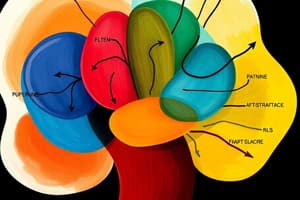Podcast
Questions and Answers
What are abstract concepts?
What are abstract concepts?
Abstract concepts are theoretical ideas that are not directly observable but can be described in symbolic or theoretical terms.
Define empirical evidence.
Define empirical evidence.
Empirical evidence is data or observations obtained through the senses or scientific experiments that help support or refute hypotheses and theories.
What is a theory?
What is a theory?
A theory is a well-substantiated explanation of some aspect of the natural or social world that can incorporate a wide range of facts, laws, and hypotheses.
Explain what a law is in the context of knowledge.
Explain what a law is in the context of knowledge.
How do general concepts relate to specialized knowledge within a discipline?
How do general concepts relate to specialized knowledge within a discipline?
What is a hypothesis?
What is a hypothesis?
Define an explanation.
Define an explanation.
What is the importance of general knowledge in terms of decision making?
What is the importance of general knowledge in terms of decision making?
Explain the misconception regarding general knowledge as a substitute for expertise.
Explain the misconception regarding general knowledge as a substitute for expertise.
Why is it important to have both quantity and quality of knowledge?
Why is it important to have both quantity and quality of knowledge?
Study Notes
Understanding General Concepts
As we delve into the realm of knowledge, it's essential to grasp the fundamentals, or what we'll call the "general" aspects of various subjects. Let's explore some foundational ideas that permeate our quest for understanding.
What is "General" in the Context of Knowledge?
In the broadest sense, "general" refers to concepts, ideas, or principles that are applicable to multiple domains, or have a wide scope. These ideas often serve as the basis for more specialized or specific knowledge within a particular discipline.
Basic Concepts and Terminology
-
Abstract Concepts: These are theoretical ideas that are not directly observable but can be described in symbolic or theoretical terms. For example, the concept of "gravity" or "natural selection" are abstract concepts that help explain observed phenomena.
-
Empirical Evidence: Empirical evidence is data or observations obtained through the senses or scientific experiments that help support or refute hypotheses and theories.
-
Theory: A theory is a well-substantiated explanation of some aspect of the natural or social world that can incorporate a wide range of facts, laws, and hypotheses. Theories often provide a coherent framework for understanding phenomena.
-
Law: A law is a statement that describes a regularity or pattern observed in the natural or social world. A law is a generalization that has been confirmed through multiple experiments or observations.
-
Hypothesis: A hypothesis is a tentative explanation for an observation or phenomenon that can be tested through experimentation or further observation. A hypothesis is a specific prediction or statement that can be confirmed or rejected.
-
Explanation: An explanation is a theoretical account of a phenomenon that specifies the mechanisms or causes that result in the observed phenomena.
-
Prediction: A prediction is a statement that describes a future event or outcome that will occur if the underlying conditions remain the same.
The Importance of General Knowledge
-
Increased Cognitive Abilities: General knowledge enhances our ability to think critically, reason logically, and solve problems. A broader understanding of the world helps us make connections and identify patterns that may not be immediately apparent.
-
Enhanced Communication: General knowledge helps us communicate more effectively with others, as we have a shared foundation of understanding based on common concepts and ideas.
-
Improved Decision Making: General knowledge enables us to make more informed decisions, as we can better understand the context and implications of choices we make.
-
Greater Empathy: General knowledge helps us understand the diverse perspectives and experiences of others, fostering greater empathy, compassion, and acceptance.
Common Misconceptions about General Knowledge
-
Specialization vs. Generalization: While specialization is essential for mastery in a specific field, general knowledge provides a solid foundation and enhances our ability to think critically and connect ideas across disciplines.
-
Quantity vs. Quality: While it's important to have a wide breadth of knowledge, it's also essential to have a deep understanding of key concepts and principles.
-
General Knowledge as a Substitute for Expertise: While general knowledge can be helpful, it is not a substitute for specialized knowledge and expertise in a particular field.
-
General Knowledge as a Fixed Entity: General knowledge is an ongoing process of learning and growing, not a static body of facts that can be memorized and forgotten.
Conclusion
General knowledge serves as the foundation for learning, critical thinking, and communication. By exploring foundational concepts and ideas, we can improve our cognitive abilities, decision-making skills, and empathy, leading to a more enriching and fulfilling life. Remember that general knowledge is an ongoing process, not a static entity, and it's essential to continuously seek out new information and perspectives.
Studying That Suits You
Use AI to generate personalized quizzes and flashcards to suit your learning preferences.
Description
Test your knowledge on foundational concepts that are applicable to various domains and serve as the basis for specialized knowledge. Explore abstract concepts, empirical evidence, theories, laws, hypotheses, explanations, predictions, and the importance of general knowledge in enhancing cognitive abilities, communication skills, decision-making, and empathy.




